November 24, 2025
In a discussion about some of the significant issues that are affecting the future of power generation, demand, and reliability, Monica Obrycki, CEO of Eau Claire Energy Cooperative, Karl Hoesly, President of Xcel Energy in Wisconsin, and Brent Ridge, CEO of Dairyland Power Cooperative joined the Eau Claire Chamber’s November Eggs & Issues to provide insights about their companies and the work they do to ensure a successful energy future.
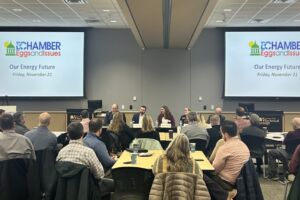
Xcel Energy is the ninth largest utility investor in the United States, serving about 3.8 million customers. Dominating the midwest, Xcel operates with an integrated system, sharing production and transmission infrastructure between the Dakotas, Minnesota, and Wisconsin. The company is an Investor Owned Utility, owned by shareholders, and regulated by the state commission.
Karl Hoesly, President of the Wisconsin division of Xcel Energy, has been with Xcel for fifteen years, serving as the Regional Vice President of Rates and Regulatory Affairs three years prior to his becoming president.
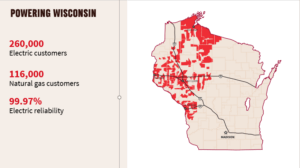
Often compared to the look of swiss cheese, Xcel Energy’s service territory in Wisconsin holds 20,000 square miles, 500 communities, and over 30 different counties. Specifically, this is 2,500 gas main miles and 20,000 electric main miles.

Xcel Energy boasts a significant wind footprint, holding the number one spot as wind energy provider since 2012. They aim to get to 88% solar by 2030, being the first energy company in the nation to put forward such an aggressive carbon goal, already being 64% carbon free today. Relying more on nuclear energy, Xcel extended the lives of their nuclear plants to 2050, emphasizing the importance of decarbonation and climate change.

In October, Xcel Energy unveiled a $60 billion investment plan to accelerate clean energy delivery, with 7% or $4 billion applied to Wisconsin and Michigan. This includes nuclear investments, adding a significant number of Current Transformers (CTs), and building additional transmission. This also includes updates to customer experience; new technology, billing system updates, and asset replacements. In terms of local investments, Western Wisconsin features 345 transmission connections owned by both Xcel and the ADC, a couple solar projects, and the Wheaton Repowering natural gas combustion turbine.
When asked about the effects of the recent change in political environment and federal policy, Hoesly says, “We have to be measured in how we deploy our renewables.” When tax credits expire, you have to ask, “‘Is it your least cost alternative on the system’ and compare that to what the other system options are going to do for it in making sure you continue to have a safe and reliable system.” Policy changes have changed the speed of deployment and how to measure which assets are to be deployed, in Hoesly’s opinion. On the state level, the legislature passed a $2 million siting study to determine safe locations for new facilities.
Transmission lines are the point of connection between power and the consumer, so building and upgrades are a necessity. Hoesly comments on the 765 line, the first in the Midwest which features a lattice structure, and the importance of the Western Wisconsin transmission connection and the grid forward connection, both 345 lines which are vertical poles. Hoesly emphasizes that, “Our goal is to never come in and just start using eminent domain…we want to work with landowners that are impacted. Energy is the oxygen to any economy and we have to make sure that we keep those lights on.”
When looking at Wisconsin and the greater Midwest region, Dairyland Energy Cooperative (DEC) fills in the gaps to Xcel Energy’s “swiss cheese.” Starting at the national level, Dairyland Energy Cooperative explained how MISO (an independent organization that delivers safe, cost-effective electricity across 15 states) works with DEC to cover roughly 50,000 square miles and four states. Utility companies responsible for generating electricity send those electrons to MISO, ensuring the energy is delivered to the right place.
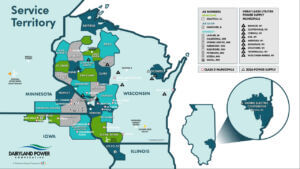
Brent Ridge, the CEO & President of DEC, commented that when we have concerns about "rolling blackouts and things like that, MSIO would be the group that's trying to avoid that, as are we." Covering four states, DEC services roughly 300,000 customers (a majority being in rural areas), working with four remarkably different legislative processes (i.e, Minnesota vs. Wisconsin vs. Iowa vs. Illinois). Being future-focused, DEC is committed to maintaining a sustainable perspective when it comes to energy production; however, as Ridge explains, “it's about the balance between carbon reduction, renewables, and maintaining a 24/7 economy that’s affordable and reliable.” To put DEC’s move away from fossil fuels into perspective, if we go back to 1999, DEC had a 98 percent reliance on coal. Today, DEC has a 37 percent reliance on coal, and by 2035, they hope to bring that number to nearly zero.
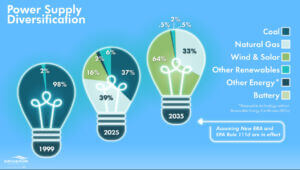
When on the topic of becoming carbon-free, “we’re talking about having to move more than 70 percent of our energy” to renewables, Ridge continues, “and that's a really big hill to fly between now and 2040.” This transition will require developments in nuclear energy, as it already provides a “massive portion of the clean energy in the United States,” says Ridge. Understanding the benefits and risks of nuclear energy will make the transition against carbon smoother. Ridge explains this requires transparent communication about what nuclear plants do with waste and continuing the conversation on challenges with nuclear energy.
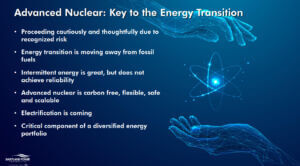
To finish the discussion on energy, Monica Obrycki, president & CEO of Eau Claire Energy Cooperative, discussed priorities and how their organization partners with DEC to bring reliable energy to the Eau Claire area. Serving roughly 13,000 members, Eau Claire Energy Cooperative is one of 24 in Wisconsin and maintains 1,726 miles of underground and overhead power lines that bring energy to Eau Claire homes and businesses. Obrycki briefly touched on how data centers, crypto, and Bitcoin mining facilities have inquired about how they could work with the cooperative, but there are no firm plans as of yet on how this might look.
More Information
Community leaders discuss energy at Eau Claire Chamber's 'Eggs and Issues' event (WEAU 13)
Utility leaders talk about the future of energy for Eau Claire, Wisconsin and beyond (Leader Telegram - $)
Posted by Gigi Galdamez & Brennen Bolopue, Governmental Affairs Interns
galdamez@eauclairechamber.org, bolopue@eauclairechamber.org